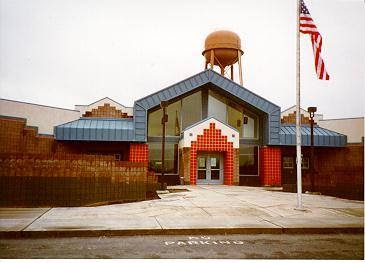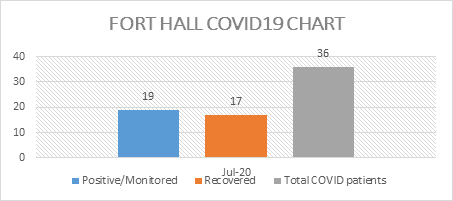
- Details
- By Native News Online Staff
FORT HALL, Idaho — Tribal officials at the Shoshone-Bannock Tribes on the Fort Hall Indian Reservation are concerned about the spike in COVID-19 cases.
As of Wednesday, the reservation has 19 COVID-19 positive cases and two hospitalizations, according to the Tribal Office of Emergency Management (TOEM). Test results were compiled by the Fort Hall Indian Health Services Unit (IHS) and Community Health Resource Center (HRSA).
Since reporting started in April, 15 reservation residents have recovered and there have been no deaths. The total number of COVID-19 cases since the pandemic began sits at 36.
“The spike in cases can be attributed to large gatherings, such as funerals, family gatherings, and parties,” Randy’L Teton, public affairs manager for the Tribes, told Native News Online on Wednesday. “There is no evidence positive cases are coming from work places.”
Strict guidelines are being enforced at all tribal entities, including the Tribe’s casino, hotel and other business enterprises and tribal buildings.

“We encourage the community to please be vigilant in wearing a face mask in public, at work and when running errands. The spike in cases is coming from contact with positive cases, please be safe,” said Eric King, the tribe’s incident commander.
In an effort to contain the deadly virus on the reservation, tribal contact tracers have been put in place to immediately contact patients who have been diagnosed with COVID-19. The tribal contact tracers maintain constant contact with those who have tested positive.
The tribal council recently approved the hiring of additional tribal contact tracers, which will bring the total to five.
Teton said tribal citizens have been very cooperative with telling the contact tracers who they have been in contact with in the previous two weeks prior to their coronavirus diagnosis.
The tribal executive director has been encouraging tribal employees to make daily logs of those they come in contact with throughout the day so that if they are diagnosed with COVID-19 they can work quickly with tribal contact tracers.
The Tribes put out the following guidelines for families living on the reservation:
1. AVOID CLOSE CONTACT WITH PEOPLE WHO ARE SICK. Stay at home if you are sick, except to get medical care. Call your medical provider.
2. WEAR FACE MASKS!
3. PRACTICE SOCIAL DISTANCING/PHYSICAL DISTANCING AT HOME, WORK AND PUBLIC SPACE.
4. Wash hands often with soap and water for 20 seconds, especially after blowing your nose, coughing, or sneezing or have been in a public place (cover your cough or sneeze with a tissue). If soap and water are not available, use a hand sanitizer with at least 60 percent alcohol.
5. Avoid touching your face, nose, eyes, etc.
6. Clean and disinfect your home and frequently touched objects and surfaces.
7. Avoid public gatherings (the recommendation from the CDC is 10 people or less, this includes birthday gatherings, family BBQ’s, meetings, etc.).
8. Avoid all non-essential travel.
COVID-19 symptoms include a fever (temperature 100.4 degrees or higher), cough, shortness of breath, headache, muscle and body aches, sore throat, fatigue/extreme tiredness, GI symptoms (nausea, vomiting, diarrhea), and loss of taste and smell. Each of our Tribal health centers, including IHS, Tribal Health and HRSA have tribal contact tracers actively tracking and monitoring active cases on the reservation.
Shoshone-Bannock tribal citizens are encouraged to call the Fort Hall Indian Health Service (IHS) at 208-238-5400 (Monday-Friday, 8-5 p.m.) or Community Health Resource Center (HRSA) at 208-478-3987 with any health concerns or questions.
For tribal resources, check out the Tribes’ COVID-19 website at www.sbtribes.com and click on COVID-19. For general questions on Idaho COVID-19, call the Hotline at 1-888-330-3010.
More Stories Like This
Native News Weekly (August 25, 2024): D.C. BriefsNavajo Nation Mourns the Passing of Former Vice President Rex Lee Jim
Deb Haaland Earns Endorsement From Communications Workers of America Local 7076
University Soccer Standout Leads by Example
Two Native Americans Named to Democratic Congressional Campaign Committee's“Red to Blue” Program
Help us defend tribal sovereignty.
At Native News Online, our mission is rooted in telling the stories that strengthen sovereignty and uplift Indigenous voices — not just at year’s end, but every single day.
Because of your generosity last year, we were able to keep our reporters on the ground in tribal communities, at national gatherings and in the halls of Congress — covering the issues that matter most to Indian Country: sovereignty, culture, education, health and economic opportunity.
That support sustained us through a tough year in 2025. Now, as we look to the year ahead, we need your help right now to ensure warrior journalism remains strong — reporting that defends tribal sovereignty, amplifies Native truth, and holds power accountable.
 The stakes couldn't be higher. Your support keeps Native voices heard, Native stories told and Native sovereignty defended.
The stakes couldn't be higher. Your support keeps Native voices heard, Native stories told and Native sovereignty defended.
Stand with Warrior Journalism today.
Levi Rickert (Potawatomi), Editor & Publisher

